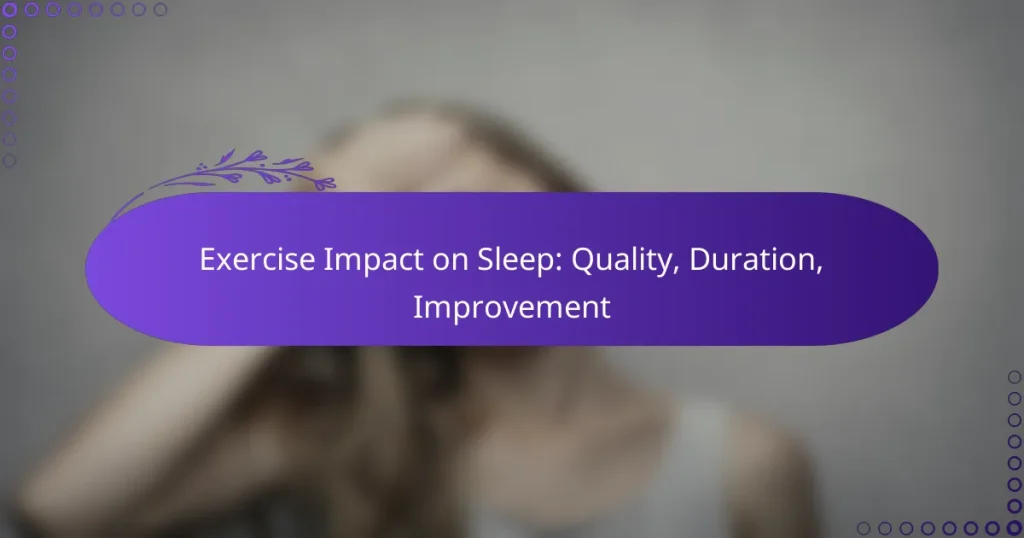Regular exercise plays a vital role in enhancing sleep quality and duration by promoting deeper sleep stages and reducing the time it takes to fall asleep. Different forms of physical activity, such as aerobic exercises and strength training, contribute uniquely to improving sleep patterns, making it essential to consider both the amount and timing of exercise for optimal benefits.
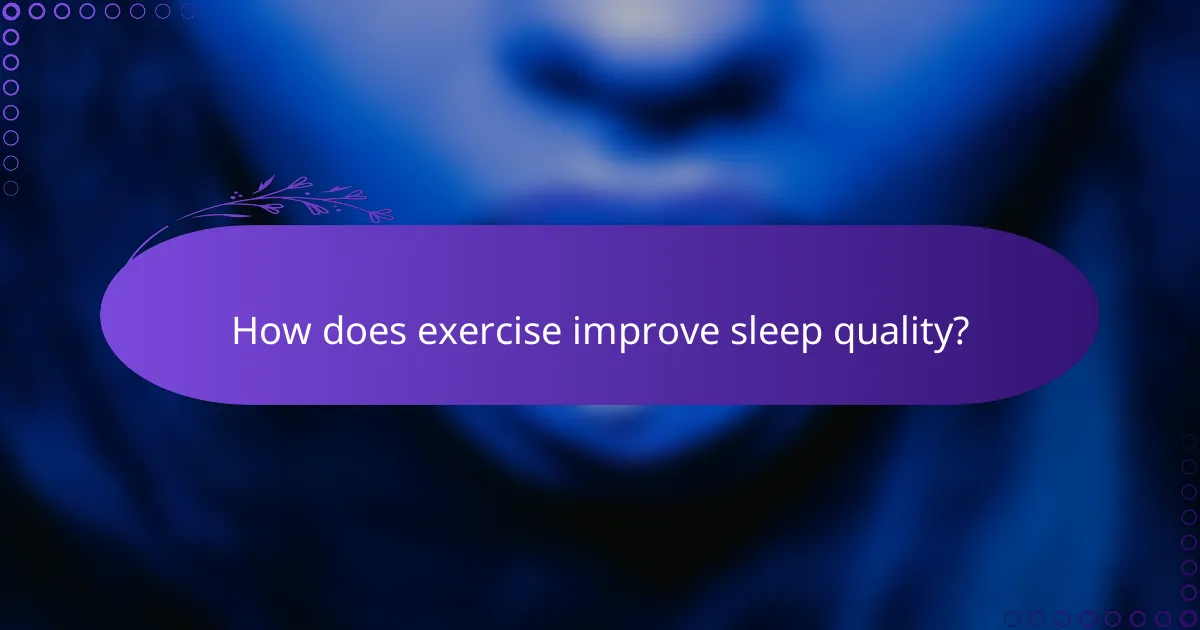
How does exercise improve sleep quality?
Exercise enhances sleep quality by promoting deeper sleep stages, reducing the time it takes to fall asleep, and increasing overall sleep efficiency. Engaging in regular physical activity can lead to more restorative sleep, which is crucial for overall health and well-being.
Increased deep sleep stages
Exercise contributes to longer periods of deep sleep, which is essential for physical recovery and mental restoration. Activities such as aerobic exercises, strength training, or even brisk walking can stimulate the body to enter deeper sleep stages more frequently.
To maximize deep sleep, aim for at least 150 minutes of moderate aerobic activity per week, spread across several days. Evening workouts may also help, but be cautious as exercising too close to bedtime can sometimes have the opposite effect.
Reduced sleep onset latency
Regular physical activity can significantly decrease sleep onset latency, which is the time it takes to fall asleep. Studies suggest that those who exercise regularly may fall asleep faster, often within 20 minutes, compared to those who do not engage in physical activity.
To achieve this benefit, consider incorporating moderate exercise into your daily routine, ideally earlier in the day. Avoid high-intensity workouts right before bedtime, as they may lead to increased alertness and make it harder to fall asleep.
Enhanced sleep efficiency
Exercise can improve sleep efficiency, which is the ratio of time spent asleep to the time spent in bed. Higher sleep efficiency indicates better-quality sleep, allowing individuals to feel more rested upon waking.
To enhance sleep efficiency, maintain a consistent sleep schedule and create a relaxing bedtime routine. Engaging in regular physical activity, such as yoga or light stretching, can also promote a smoother transition to sleep, further improving overall sleep quality.
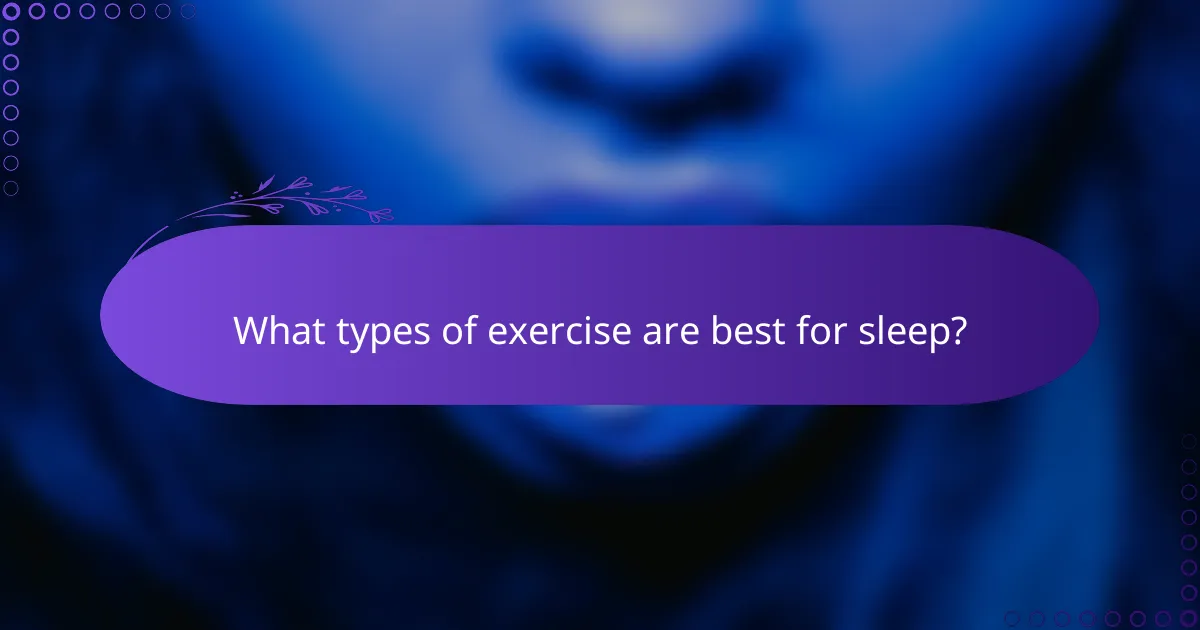
What types of exercise are best for sleep?
Aerobic exercises, strength training, and flexibility workouts all contribute positively to sleep quality and duration. Each type offers unique benefits that can help improve your overall sleep patterns.
Aerobic exercises like running
Aerobic exercises, such as running, cycling, or swimming, are particularly effective for enhancing sleep. These activities increase heart rate and promote the release of endorphins, which can lead to improved mood and reduced anxiety, both of which are conducive to better sleep.
Engaging in moderate aerobic exercise for about 150 minutes per week can significantly improve sleep quality. Aim for sessions lasting 30 minutes, five times a week, to reap the benefits without overexerting yourself.
Strength training benefits
Strength training, including weight lifting and resistance exercises, can also enhance sleep quality. By building muscle and increasing metabolism, these workouts help regulate sleep hormones and promote deeper sleep cycles.
Incorporating strength training into your routine two to three times a week can lead to noticeable improvements in sleep. Focus on major muscle groups and consider compound movements like squats and deadlifts for maximum effect.
Yoga and flexibility exercises
Yoga and flexibility exercises are excellent for promoting relaxation and reducing stress, which can significantly enhance sleep quality. These practices often include breathing techniques and mindfulness, helping to calm the mind and prepare the body for rest.
Practicing yoga for 20-30 minutes a few times a week can help improve sleep patterns. Consider incorporating gentle styles, such as Hatha or Yin yoga, especially in the evening, to maximize relaxation before bedtime.
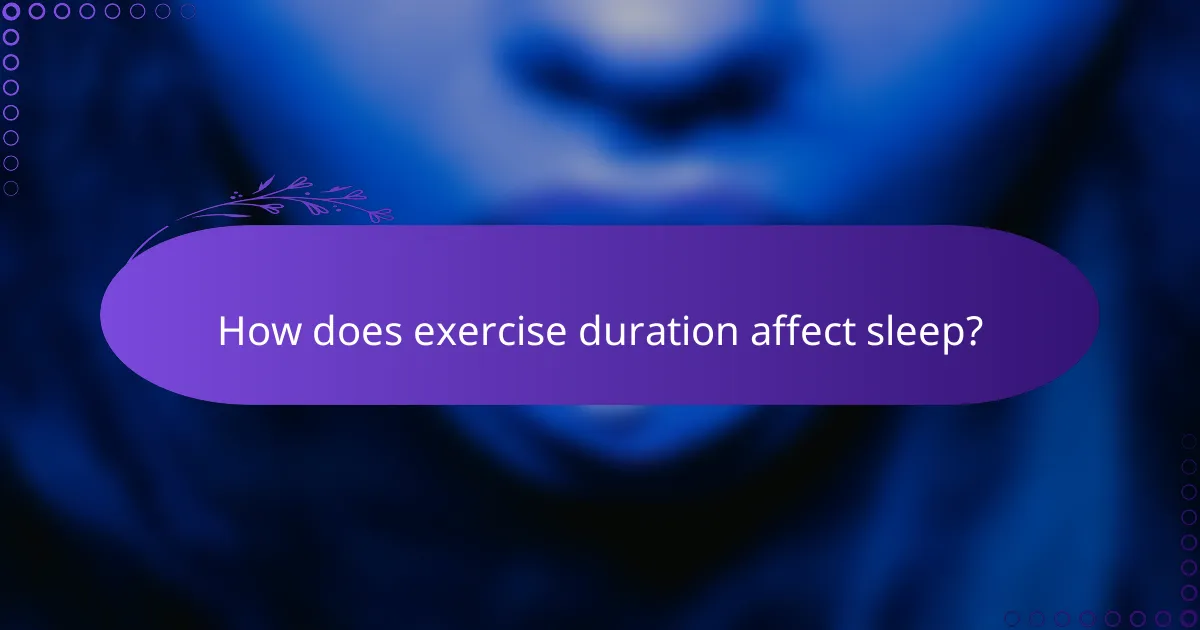
How does exercise duration affect sleep?
Exercise duration significantly impacts sleep quality and duration. Engaging in regular physical activity can enhance sleep patterns, but the amount and timing of exercise are crucial for optimal benefits.
Optimal duration for sleep improvement
For most adults, engaging in moderate exercise for about 150 minutes per week can lead to noticeable improvements in sleep quality. This translates to roughly 20-30 minutes of exercise most days. Activities such as brisk walking, cycling, or swimming are effective options.
Timing is also important; exercising too close to bedtime may disrupt sleep. Aim to complete workouts at least a few hours before going to bed to allow your body to wind down.
Effects of excessive exercise
While regular exercise is beneficial, excessive physical activity can lead to sleep disturbances. Overtraining can increase cortisol levels, which may interfere with the ability to fall asleep and stay asleep. Signs of overtraining include fatigue, irritability, and sleep issues.
To avoid these negative effects, balance your exercise routine with adequate rest and recovery. Incorporating rest days and varying workout intensity can help maintain both physical health and sleep quality.
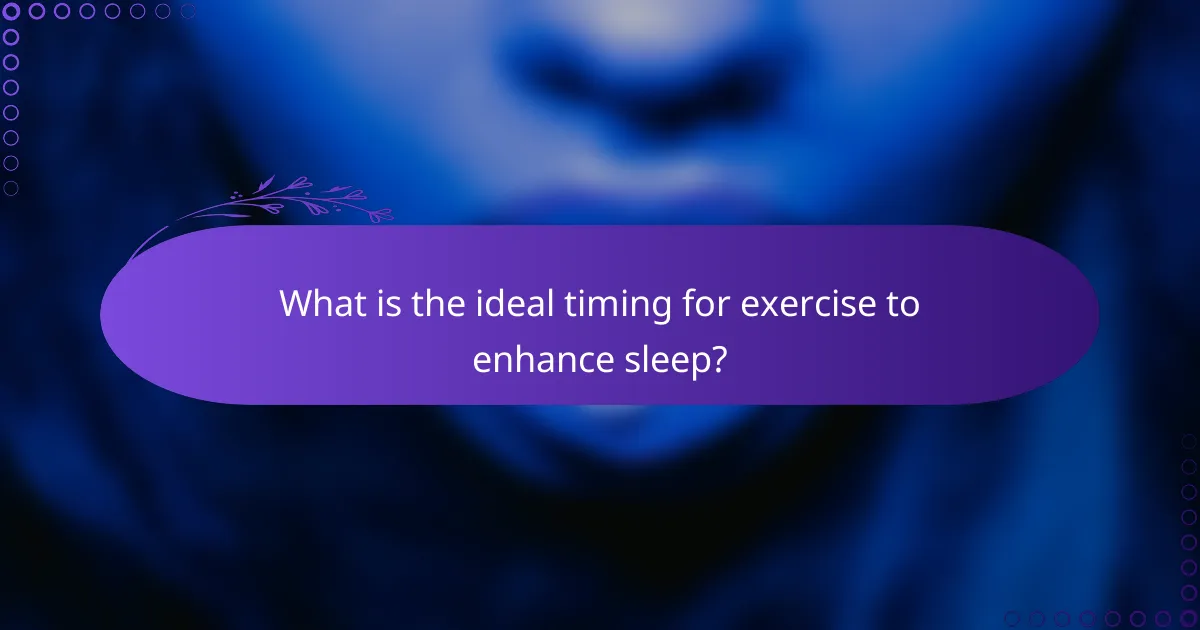
What is the ideal timing for exercise to enhance sleep?
The ideal timing for exercise to enhance sleep varies by individual, but generally, morning workouts can promote better sleep quality, while evening exercise may disrupt sleep for some. It is essential to consider personal schedules and how your body responds to different workout times.
Morning workouts for better sleep
Exercising in the morning can help regulate your circadian rhythm, leading to improved sleep quality at night. Morning workouts often boost energy levels and mood throughout the day, making it easier to wind down in the evening.
Additionally, morning exercise can increase exposure to natural light, which is beneficial for maintaining a healthy sleep-wake cycle. Aim for at least 30 minutes of moderate activity, such as brisk walking or jogging, to reap these benefits.
Evening exercise considerations
Evening workouts can be effective for some individuals but may interfere with sleep for others. High-intensity exercises close to bedtime can elevate heart rate and body temperature, making it harder to fall asleep.
If you prefer evening workouts, consider lighter activities like yoga or stretching, which can promote relaxation. Aim to finish any vigorous exercise at least 2-3 hours before bedtime to minimize potential disruptions to your sleep.
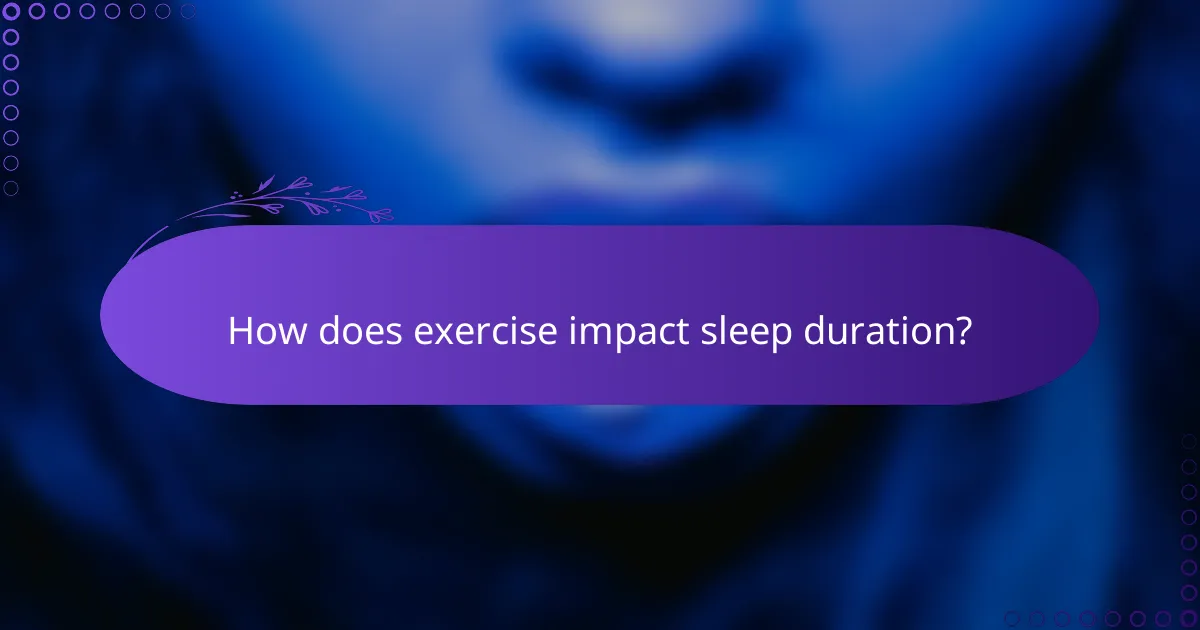
How does exercise impact sleep duration?
Exercise generally increases sleep duration by promoting deeper and more restorative sleep. Engaging in regular physical activity can help individuals fall asleep faster and stay asleep longer, contributing to overall improved sleep quality.
Increased total sleep time
Regular exercise is associated with longer total sleep time, often adding up to an hour or more of sleep each night. Activities such as aerobic exercises, strength training, or even moderate walking can enhance sleep duration, particularly when performed earlier in the day.
To maximize the benefits, aim for at least 150 minutes of moderate-intensity exercise weekly, as recommended by health organizations. However, individual responses may vary, so it’s essential to find a routine that works best for you.
Effects on sleep architecture
Exercise positively influences sleep architecture, which refers to the structure and pattern of sleep cycles. It tends to increase the proportion of deep sleep (slow-wave sleep), crucial for physical recovery and overall health.
Moreover, regular physical activity can reduce the time spent in lighter sleep stages, leading to a more restorative sleep experience. To optimize these effects, consider incorporating a mix of aerobic and resistance training into your weekly routine, while avoiding vigorous exercise close to bedtime, as it may disrupt sleep onset.

What are the psychological benefits of exercise on sleep?
Exercise significantly enhances sleep quality and duration by positively influencing psychological well-being. Engaging in regular physical activity can lead to reduced anxiety and stress levels, as well as improved mood and mental health, all of which contribute to better sleep outcomes.
Reduction in anxiety and stress
Regular exercise is a powerful tool for reducing anxiety and stress, both of which can disrupt sleep. Physical activity stimulates the production of endorphins, chemicals in the brain that act as natural painkillers and mood elevators, helping to alleviate feelings of tension and worry.
To maximize these benefits, aim for at least 150 minutes of moderate aerobic exercise per week, such as brisk walking or cycling. This level of activity can lead to noticeable improvements in stress levels and, consequently, sleep quality.
Improved mood and mental health
Exercise has a profound impact on mood and mental health, which are closely linked to sleep patterns. Engaging in physical activity can help combat symptoms of depression and anxiety, leading to a more relaxed state conducive to restful sleep.
Incorporating activities like yoga or team sports can enhance social connections and provide emotional support, further boosting mental well-being. Aim for a balanced routine that includes both aerobic and strength-training exercises to achieve optimal mental health benefits.

How can individuals track exercise and sleep improvements?
Individuals can track exercise and sleep improvements by utilizing various tools and methods that monitor their physical activity and sleep patterns. These tools can provide insights into how exercise affects sleep quality and duration, helping users make informed adjustments to their routines.
Using sleep tracking apps
Sleep tracking apps are designed to monitor sleep patterns and provide feedback on sleep quality. Many apps use smartphone sensors or wearable devices to analyze sleep stages, duration, and disturbances. Popular options include Sleep Cycle and Calm, which offer insights and tips for improving sleep based on collected data.
When choosing a sleep tracking app, consider features like integration with other health apps, user interface, and data privacy policies. Aim for apps that provide actionable insights, such as optimal sleep times based on your exercise schedule.
Fitness trackers for monitoring
Fitness trackers can effectively monitor both exercise and sleep, providing a comprehensive view of your health. Devices like Fitbit and Garmin track daily activity levels, heart rate, and sleep stages, allowing users to see how their exercise impacts sleep quality and duration over time.
When selecting a fitness tracker, look for features such as sleep analysis, battery life, and compatibility with smartphones. Regularly review the data to identify patterns and make adjustments to your exercise routine that may enhance your sleep quality.

What are common misconceptions about exercise and sleep?
Many people believe that exercise always guarantees better sleep, but this isn’t universally true. While physical activity can improve sleep quality and duration, the timing, type, and intensity of exercise play crucial roles in determining its effects on sleep.
Exercise timing and its effects on sleep
The timing of exercise significantly influences sleep quality. Engaging in vigorous workouts close to bedtime can lead to increased heart rate and adrenaline, making it harder to fall asleep. Ideally, aim to finish intense exercise at least two to three hours before bedtime to allow your body to wind down.
Conversely, moderate exercise earlier in the day can promote better sleep. Activities such as walking, cycling, or yoga can help regulate your circadian rhythm and prepare your body for rest.
Types of exercise and their impact on sleep
Not all exercises affect sleep in the same way. Aerobic exercises, like running or swimming, are generally linked to improved sleep quality and longer sleep duration. Strength training can also be beneficial, but excessive intensity may lead to restlessness at night.
Incorporating relaxing activities, such as stretching or yoga, can enhance sleep by reducing stress and promoting relaxation. Aim for a balanced routine that includes both aerobic and calming exercises for optimal sleep benefits.
How much exercise is needed for better sleep?
While individual needs vary, most experts recommend at least 150 minutes of moderate aerobic activity per week for overall health, which can also support better sleep. This translates to about 30 minutes a day, five days a week.
For those who struggle with sleep, even short bouts of physical activity, such as a brisk 10-minute walk, can lead to improvements. Consistency is key; regular exercise is more effective than sporadic workouts.
Common pitfalls to avoid
One common pitfall is overtraining, which can lead to fatigue and disrupted sleep patterns. It’s essential to listen to your body and allow for adequate rest and recovery. Additionally, avoid relying solely on exercise to solve sleep issues; a holistic approach that includes good sleep hygiene is crucial.
Another mistake is neglecting the importance of a pre-sleep routine. Establishing calming rituals, such as reading or meditating, can complement the benefits of exercise and enhance your ability to fall asleep.
